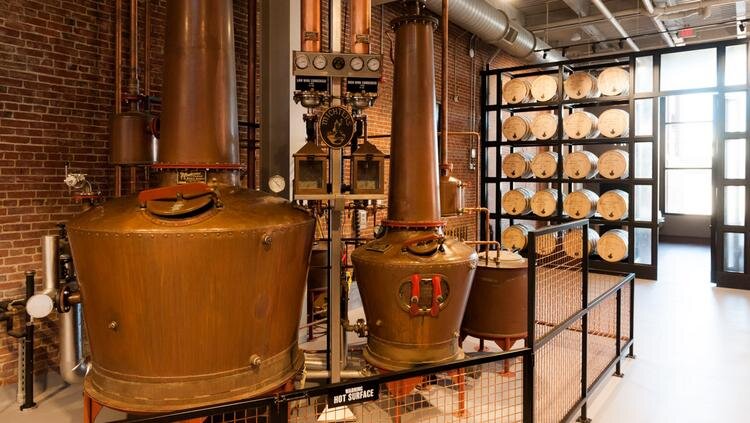By: Jonas Bastien
Mark Twain once said, “too much of anything is bad…but too much…whiskey is barely enough.”[i] Because of recently imposed tariffs on steel and aluminum, Kentucky bourbon is caught in the middle of an international tariff battle[ii], which has overburdened the entire industry and led to decreasing production across the state.[iii]
Tariffs in the United States (U.S.) present a troubled past. During the Great Depression, tariffs promised to jumpstart the economy by forcing increased reliance on domestic industry but instead deepened and prolonged the economic downturn.[iv] After the Great Depression, Congress delegated authority to impose tariffs more broadly to the executive branch.[v] This decision granted the Executive branch—specifically the President—greater independence from the domestic pressures which faced Congress in domestic economic policy.[vi] As a result, the U.S. entered into trade agreements without political pressures from Congress and joined the World Trade Organization, among other global trade organizations.[vii]
In early 2016, the federal government levied significant tariffs upon steel and aluminum imports as part of Section 232 of the Trade Expansion Act of 1962.[viii] The Act allows the Executive branch to impose trade restrictions on imported goods to protect matters of national security. [ix] The utility of tariffs is twofold: first, they are used to protect emerging domestic industries.[x] Second, they promote domestic industries by decreasing consumer desire for similar foreign products.[xi] However, as a result, retaliatory tariffs in foreign markets upon American-made goods are often imposed upon U.S. exports. In retaliation to the 2016 tariffs imposed on steel and aluminum imports, the European Union (E.U.), China, Mexico, and other foreign markets imposed tariffs on American exports, targeting (among others) one of our nation’s greatest exports: bourbon. [xii]
Such precise retaliatory tariffs stifled the bourbon industry.[xiii] While a key strategy of the bourbon industry is international expansion, it can only expand while keeping consumer prices to a level in which its international reach to consumers can be optimized.[xiv] Growing consumer demand abroad means more opportunity in Kentucky,[xv] which signifies more economic opportunity for Kentuckians.[xvi] Jane Morreau, Brown-Forman’s chief financial officer, demonstrated the impact upon Brown-Forman by forecasting a decrease in revenue of $125 million for the year.[xvii] The risk is that bourbon will lose customers to other similar (but less tasty) tariff-free whiskeys.[xviii] On a smaller scale, a distillery in the Lexington, Kentucky community doing business as “James E. Pepper” halted a planned expansion into the European market after the imposition of such tariffs.[xix] The impact has been both widespread and painful.[xx]
Overall, within the past ten years, bourbon production increased resulting in more than two barrels of spirits in Kentucky for every single person living in the state.[xxi] These barrels are valued at around three-billion dollars, more than three times as much as the data showed in 2009.[xxii] The industry also contributed to more than 20,000 jobs and provided more than 235 million in tax revenue for Kentucky each year.[xxiii] The overall export value of the entire industry tripled in the last 20 years. The industry also promotes the commodity industry, which struggles to meet the ever-increasing demand.[xxiv]
Lastly, the theory of “Law and economics” describes an economic analysis of the law.[xxv] The main force behind this analysis is economic efficiency.[xxvi] Before the imposition of tariffs, the bourbon industry was growing at a rapid pace, showing great promise as the palettes of consumers in Asia, Africa, and the countries in the E.U. began to desire a taste for bourbon. But a hand was laid upon the scales of consumer purchases making bourbon more expensive abroad than what those consumers were willing to pay. The result has been fewer jobs in the bourbon industry, less economic growth for Kentucky, and less opportunities for the bourbon industry to develop key footholds in foreign markets. While bourbon may be a pawn in a larger picture, Kentuckians are the ones being hurt the most. This hurt is one the industry hopes will not be long-term.[xxvii] Key events in the future, such as the 2020 presidential election, will be sure to reveal further economic outlooks for the bourbon industry over the next decade.[xxviii]
[i] Yannick Socolov, “Too much of anything is bad, but too much good whiskey is barely enough.” — Mark Twain, Medium (Nov. 11, 2019), https://medium.com/@Yannimoto/too-much-of-anything-is-bad-but-too-much-good-whiskey-is-barely-enough-mark-twain-a9e5b9ca12aa [https://perma.cc/TR4Z-MY8Z].
[ii] Amy Hopkins, Brown-Forman CEO on tariffs: ‘We are most affected company’, The Spirits Business, https://www.thespiritsbusiness.com/2019/09/brown-forman-ceo-on-tariffs-we-are-most-affected-company/ [https://perma.cc/FJM9-Q8QD].
[iii] Id.
[iv]Id.
[v] Clark Packard, Congress Should Take Back Its Authority Over Tariffs, Foreign Policy (May 4, 2019), https://foreignpolicy.com/2019/05/04/congress-should-take-back-its-authority-over-tariffs-trump/ [https://perma.cc/453U-RQNF].
[vi] Id.
[vii] Andrew Chatzky, The Truth About Tariffs, Council on Foreign Relations, (May 16, 2019), https://www.cfr.org/backgrounder/truth-about-tariffs [https://perma.cc/8V5W-2PJ2]
[viii] Clark Packard, Congress Should Take Back Its Authority Over Tariffs, Foreign Policy (May 4, 2019), https://foreignpolicy.com/2019/05/04/congress-should-take-back-its-authority-over-tariffs-trump/ [https://perma.cc/453U-RQNF].
[ix] Christopher A. Casey, Cong. Research Serv., 7-5700, U.S. Tariff Policy: Overview (2018).
[x] Chatzky, supra note 7.
[xi] Id.
[xii] Hopkins, supra note 2.
[xiii] Erica York, Kyle Pomerleau, Scott Eastman, Tracking the Economic Impact of U.S. Tariffs and Retaliatory Actions, Tax Foundation (May 31, 2019), https://taxfoundation.org/tariffs-trump-trade-war/ [https://perma.cc/8S7J-JF6X].
[xiv] Hopkins, supra note 2.
[xv] Id.
[xvi] Id.
[xvii] Id.
[xviii] Id.
[xix] Janet Patton, Exports down as trade dispute gives whiskey makers a major hangover, Lexington herald leader (March 21, 2019), https://www.kentucky.com/news/business/bourbon-industry/article228222864.html.
[xx] Hopkins, supra note 2.
[xxi] Press release on Bourbon Industry Economic Impact, Kentucky Distillers’ Association, https://kybourbon.com/make-it-a-double-new-study-shows-bourbon-industry-has-doubled-economic-impact-in-10-years/ [https://perma.cc/BP6U-L9RE].
[xxii] Id.
[xxiii] Id.
[xxiv] Id.
[xxv] Paul H. Rubin, Law and Economics, The Library of Economics and Liberty, https://www.econlib.org/library/Enc/LawandEconomics.html.
[xxvi] Id.
[xxvii] David Meyer, Kentucky Distilleries Worried after Trump trade war, Fortune (Sept. 28, 2018), https://fortune.com/2018/09/28/kentucky-bourbon-barrel-record-tariffs/ [https://perma.cc/5RK3-YXYW].
[xxviii] Analyst on Chinese involvement in trade war, RFDTV (Oct. 03, 2019), https://www.rfdtv.com/story/41136606/analyst-china-likely-to-wait-until-2020-to-conclude-trade-war#.XboDpS2ZPRY [https://perma.cc/AU5Q-XQC5].


